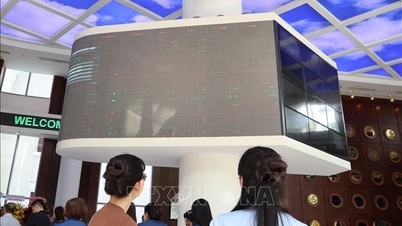Illustrative photo. (Photo: MINH PHUONG)
This is considered an important adjustment to ensure policy stability, create social consensus, and continue to improve tax calculation methods to plug budget revenue loopholes.
Maintain stable tax policy on securities
In previous drafts, the Ministry of Finance proposed a tax calculation for securities transfers in the direction of applying a rate of 20% on the income, i.e. the selling price minus the purchase price and related expenses. However, after the process of research, consultation and impact assessment, the drafting agency decided not to change the current policy, continuing to maintain the tax rate of 0.1% on the total value of each transfer.
According to the Ministry of Finance, this method is simple, transparent, easy to apply for both investors and tax authorities, and is suitable for the characteristics of the stock market - where transactions take place frequently, with large volumes and continuous fluctuations. Keeping the tax rate stable also aims to avoid causing disruption and chaos in the capital market in the context that the Government is promoting solutions to develop the stock market into a medium and long-term capital mobilization channel for the economy .
However, to deal with the loss of revenue from capital transfer activities - especially in cases where individuals do not declare the correct cost price, or do not have enough documents to determine the purchase price and costs, the Ministry of Finance still proposes to maintain the regulations on the two methods of tax calculation.
Drop the proposal to increase real estate tax, only clarify the time of tax calculation
Another notable change is that the Ministry of Finance has withdrawn the proposal to impose a 20% tax on income from real estate transfers. Instead, this draft only focuses on adjusting regulations on the time of determining tax obligations.
Currently, the Law on Personal Income Tax (Article 13) stipulates that the time to determine taxable income is the time when the transfer contract takes effect. However, in practice, in many cases the seller authorizes the buyer to pay tax on his behalf; or only when the buyer completes the registration procedure for the issuance of a certificate of ownership and right to use does the management agency determine the tax obligation. This application is inconsistent, easily causing delays and complaints.
To overcome this, the Ministry of Finance proposed to add a regulation: The time to determine taxable income from real estate transfer is the time when the contract becomes effective according to law or the time of registration of ownership and right to use real estate. This regulation is considered to be consistent with the 2024 Land Law, increasing transparency and creating a solid legal basis for tax authorities, limiting delays and taking advantage of loopholes to evade taxes.
The Ministry of Finance’s withdrawal of the proposal to increase taxes on both securities and real estate shows careful consideration of policy stability, market reaction and implementation. Instead of changing tax rates, which can easily cause psychological disturbance and impact investment and business activities, the draft focuses on clarifying the calculation method, specifying the time when tax obligations arise and diversifying the calculation methods for different cases.
The draft Law on Personal Income Tax (amended) will continue to be completed and submitted to the National Assembly for discussion at the October 2025 session. This is considered an important adjustment step, aiming to perfect the personal income tax policy, both ensuring budget revenue and creating a stable and transparent investment and business environment, in line with the requirements of sustainable development of the economy.
According to Nhan Dan Newspaper
Source: https://baothanhhoa.vn/bo-tai-chinh-bo-de-xuat-ap-thue-20-voi-bat-dong-san-giu-nguyen-thue-chung-khoan-260641.htm



![[Photo] National Assembly Chairman Tran Thanh Man attends the 725th anniversary of the death of National Hero Tran Hung Dao](https://vphoto.vietnam.vn/thumb/1200x675/vietnam/resource/IMAGE/2025/10/12/1760285740475_ndo_br_bnd-8978-jpg.webp)

![[Photo] The 1st Government Party Congress held a preparatory session.](https://vphoto.vietnam.vn/thumb/1200x675/vietnam/resource/IMAGE/2025/10/12/1760257471531_dsc-4089-jpg.webp)


![[Photo] Delegation attending the Government Party Congress visited President Ho Chi Minh's Mausoleum](https://vphoto.vietnam.vn/thumb/1200x675/vietnam/resource/IMAGE/2025/10/12/1760240068221_dsc-3526-jpg.webp)

































































































Comment (0)